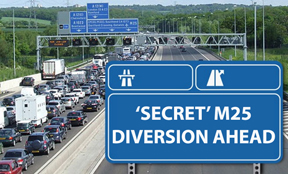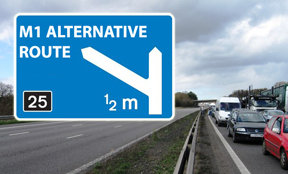
The Dart Charge for the Dartford Tunnel - or Dartford Crossing as it is correctly known - is typically paid when using two tunnels and the QE2 Bridge over the River Thames between Kent, to the south and Thurrock, Essex, to the north. But do you have to pay the Dart Charge to use it at Christmas, New Year, weekends, evenings and bank holidays, motoring journalist and expert Pete Barden reveals the facts.
-
TABLE OF CONTENTS
-
Do I have to pay the Dart Charge at weekends?
-
Do I have to pay for crossings in the evening?
-
Are the bridge and tunnels free on Sundays?
-
Is the Dartford Crossing free on Christmas Day?
-
Is the Dart Charge free on New Year’s Eve and Day?
-
When is the Dartford Crossing free to use?
-
Do I pay the Dartford Crossing Dart Charge both ways?
-
How much does it cost to use?
-
What are the fines if I forget to pay?
-
Do electric cars have to pay to use the Dartford Crossing?
 Do I need to pay to use the Dartford
Tunnel on a Sunday? (Credit: N Chadwick )
Do I need to pay to use the Dartford
Tunnel on a Sunday? (Credit: N Chadwick )
Dartford Crossing price rise - with 40% hike coming
Hard-pressed drivers are about to be hit with a 40% price hike for using the Dartford Crossing. Here are the new prices drivers will be charged from September 1, 2025.
Here’s a clear comparison of the old vs new Dartford Crossing charges coming into effect from 1 September 2025:
| Vehicle Type | Previous Charge | New Charge | Change |
|---|---|---|---|
| Car drivers | £2.50 | £3.50 | +£1.00 (40%) |
| Buses, coaches, vans and 2‑axle commercial vehicles | £3.50 | £4.20 | +£0.70 (≈20%) |
| Multi‑axle vehicles (3+ axles) | £6.00 | £8.40 | +£2.40 (40%) |
| Local resident annual scheme (Dartford & Thurrock) |
Do I have to pay the Dart Charge at weekends?
Yes. During chargeable hours - 6am to 10pm - you will need to pay the relevant charge across the entire weekend period.
Do I have to pay for crossings in the evening?
Evening crossings are chargeable up until 10pm, when the using the service becomes free until 6am the following morning.
Are the bridge and tunnels free on Sundays?
The bridge and tunnels are not free on Sundays/ You will have to pay to use the tunnels and QE2 Bridge on a Sunday - during usual hours when payment is required, as it is always free to use between 10pm and 6am.
Is the Dart Charge free on Christmas Day?
You will need to pay to use the tunnels or bridge on Christmas Day. With many people visiting friends and family, drivers might not be familiar with the payment system now that booths have been removed. Read on to find out how to pay below.
Is the Dartford Crossing free on Boxing Day?
Sadly, no festive cheer here, either - you will need to pay the charge when using the bridge or tunnels on Boxing Day.
What about the rest of the Christmas period?
All users of the tunnels or QE2 Bridge will need to pay the charge across the entire Christmas period - during chargeable hours.
Do I have to pay to use the crossing on New Year's Eve and New Year's Day?
Again, you will need to pay the charge on both New Year's Eve and New Year's Day, during operational hours.
Subscribe for free motoring and travel news here - support independent journalism
Do I have to pay the Dart Charge at Easter?
Yes, there are no treats for drivers using the Dartford Crossing - with payment as normal during standard charging hours for Good Friday, Easter Sunday and Easter Monday.
When is it free to use?
Drivers will not need to pay for using the tunnels and QE2 Bridge between 10pm and 6am seven days a week.
Do I have to pay the Dartford Crossing Dart Charge both ways?
Yes - you will need to pay both ways. Failure to do this could result in a fine of up to £105 for each missed payment.
Can I pay the Dart Charge at toll booths?
The toll booths were removed in 2014 to help speed up the flow of traffic using the bridge and tunnels. The booths were replaced by a new system where users must either pay in advance, or by midnight the day after they cross. Failure to do this is likely to result in a fine of £70, which can be halved if paid within 14 days or increased to £105 if not paid within 28 days.
How do I pay now the toll booths have gone?
There are several ways to pay, but remember, you must pay by midnight the day after use at the latest. Payment methods for the tunnel and QE2 Bridge are as follows:
- Pay online by logging on to the Dart Charge payment system here. This is open 24 hours a day, seven days a week.
- pay with cash at your nearest Payzone store
- set up an account by post
- pay in advance or top-up your account by post
- pay or set up an account by phone
Drivers who want to pay can use the following numbers, between the stated hours:
Contact centre
Telephone: 0300 300 0120
Textphone: 18001 0300 300 0120
Every day, 8am to 8pm
How much does it cost to use during paid hours?
Official pricing is as follows. Prices are for each way:
Cars and motorcycles - each way
| Vehicle class | One-off payment | Pay as you go | Pre-pay | |
|---|---|---|---|---|
| Motorcycles, mopeds and quad bikes | A | Free | Free | Free |
| Cars (including trailers), motorhomes and any minibuses that have 9 or fewer seats (including the driver’s seat) | B | £3.50 | £3.50 | £2.80 |
Buses, coaches, vans and other goods vehicles - each way
| Vehicle class | One-off payment | Pay as you go | Pre-pay | |
|---|---|---|---|---|
| Vehicles with 2 axles | C | £4.20 | £4.20 | £3.60 |
| Vehicles with more than 2 axles | D | £8.40 | £8.40 | £7.20 |
What are the fines if I forget to pay after using the tunnels and QE2 Bridge?
Forgetting to pay the Charge can result in a £70 fine. This will be halved to £35 if paid within 14 days, or increased to £105 if not paid within 28 days. And you will still be liable to pay for the charge.
Will I get a reminder that I need to pay after using the crossing?
No. There are no reminders sent out after a vehicle has used the tunnels or QE2 Bridge, it is the vehicle's registered keeper's job to pay the Charge.
Do electric cars pay the Dartford Crossing Dart Charge?
Yes. Electric cars and other EVs will need to pay the full Dartford Crossing Dart Charge without any discount.
Latest - is the Dartford Crossing QE2 Bridge closed due to Storm Bram and other storms?
Storm Bram is forecast to bring disruption across parts of the UK – but what about drivers using the Dartford Crossing? The Met Office has said rain will move across much of England and Wales through Tuesday 8 December, accompanied by an extended yellow severe weather warning. With some flooding, tricky travel conditions, and gale-force winds as the day goes on.
That means drivers should prepare for gusts that could make the QEII Bridge hazardous for high-sided vehicles. National Highways typically shuts the bridge when winds reach around 50mph, with traffic diverted via the east tunnel, causing delays.
In stormy weather, the QE2 Bridge can be closed to some or all types of traffic. This can cause long delays as all traffic is diverted through the tunnels, so check before you travel. The National Highways Twitter account will keep you up to date. Check out details on Dartford Crossing closures here.
I am disabled, do I need to pay to cross?
You will not need to pay to cross if you get free UK vehicle tax because of disability.
Latest motoring news and guides
Take a look at more of our top motoring-related content here...
-
CAR TAX SHOCK: How much is my car tax going to go up?
-
CAN I STILL DRIVE?: My driving licence has expired - can I keep driving while I wait for a new one?
-
INSURE AND SAVE: How can I cut car insurance quote? Seven tips that work
-
DRIVERS IN 20MPH PERIL: How fast in a 20mph zone will get a speeding ticket in London
-
TOP EVS FOR BRITS: What is the most popular electric car (EV) for UK buyers?
-
TESTING TIMES: What day of the week are driving tests released?
-
SECRET EXITS: What are secret exits on motorways like the M25 and can I use them
-
M25 JAM BUSTER: M25 alternative routes revealed
-
SECRET PARKING FINES: Secret parking offences you're committing but don't realise
-
PAVEMENT PERILS: Can you park on pavements in the UK and what are the fines if not?
-
SUNGLASSES SHOCK: Are my sunglasses legal for driving - how to check instantly?
-
NUMBER PLATES EXPLAINED: How old is a car by its number plate? Full list
-
SPEEDING TICKET CHECK: Will I always get a speeding ticket after being flashed
-
AVOID POINTS: Will I get a speed awareness course instead of points?
-
DRIVING ABROAD DOCUMENTS: Do I need an international driving permit for France, Spain, Greece and more
-
WHITE LINES EXPLAINED: What are the rules around double white lines and the risk of £1,000 fine?
-
BRUM: DEAL Do I pay the Birmingham Clean Air Zone at weekends?
-
GOT YOUR NUMBER: What does my driving licence number reveal about me?
-
FAKE COP SHOCK: How to spot a fake undercover police car
-
ELECTRIC LICENCE TO DRIVE: Do I need an electric car licence and driving test in the UK?
-
VAPE RULES: Can I vape in a car with kids in it?
-
LICENCE TIMES: When can I apply for a provisional licence?
-
E-SCOOTER LAWS: Are electric scooters Legal in the UK now? When is the law changing?
-
SLIDERS MUST-KNOW: Can I drive in sliders in the UK?
-
DOT CHECK: What are the black dots on my windscreen for?
-
CAR TRACKER: How can I find out who owns a car
-
CHARGE AND DRIVE: Electric car charging points at UK airports for public use - 2022
-
TYRE-CHECK TOOL: How old are my tyres - find out instantly here
-
CAR FUTURE: What happens to a car when the owner dies?
-
SPARE WHEEL RULES: How far and how fast can I drive on a space saver spare wheel
-
TICKET RISK: Can I be fined if the car park ticket machine is not working?
-
M6 JAM BUSTER: Is the M6 Toll Road free in the evening and at weekends?
-
PAY OR NOT PAY: How much is the Tamar Bridge toll and when do I need to pay it?
Why do drivers still have to pay for the Dartford Crossing, when it was meant to be free by now?
The Dartford Crossing is a road crossing over the River Thames in England, connecting Kent and Essex. It is the busiest road crossing in the UK, with over 160,000 vehicles using it each day.
The crossing was originally opened in 1963 as the Dartford Tunnel. A second tunnel was added in 1980, and the crossing was renamed the Dartford Crossing in 1991.
When the Dartford Crossing was first opened, there was no charge to use it. However, in 2003, the government introduced a charge for using the crossing during peak hours. The charge was originally £1.50 for cars, but it has since been increased to £2.50.
The government said that the charge was necessary to manage traffic congestion and to pay for the cost of running the crossing. However, many drivers have criticized the charge, arguing that it is unfair and that the crossing should be free to use.
In 2009, the government announced that the Dartford Crossing would be made free to use once the cost of construction and maintenance had been paid off. This was expected to happen in 2017. However, in 2016, the government announced that the charge would remain in place indefinitely.
The government said that the decision to keep the charge in place was necessary to manage traffic congestion and to fund investment in other transport infrastructure. However, many drivers have been left disappointed and angry by the decision.
Why is the Dartford Crossing still not free?
There are a number of reasons why the Dartford Crossing is still not free, despite the government's original promise to abolish the charge.
- Traffic congestion: The government says that the charge is necessary to manage traffic congestion on the Dartford Crossing. Without the charge, the government says that traffic levels would increase significantly, leading to congestion and delays.
- Cost of maintenance: The Dartford Crossing is a complex and expensive piece of infrastructure. The government says that the charge is necessary to help cover the cost of maintaining and operating the crossing.
- Funding for other transport projects: The government says that the revenue from the Dartford Crossing is used to fund investment in other transport infrastructure projects, such as road and rail improvements.
What are the arguments in favour of making the Dartford Crossing free?
There are a number of arguments in favour of making the Dartford Crossing free.
- Fairness: Many drivers argue that the charge is unfair, particularly for those who have to use the crossing on a daily basis. They say that the crossing should be free to use, like all other major roads in the UK.
- Economic growth: Some argue that making the Dartford Crossing free would boost the local economy, by making it easier and cheaper for people to travel between Kent and Essex.
- Environmental benefits: Reducing traffic congestion on the Dartford Crossing would have a number of environmental benefits, such as reducing air pollution and noise pollution.
What are the arguments against making the Dartford Crossing free?
There are also a number of arguments against making the Dartford Crossing free.
- Cost: The government says that it would cost around £200 million per year to make the Dartford Crossing free. This money would have to be found from somewhere else, such as taxes or other government spending.
- Traffic congestion: The government says that making the Dartford Crossing free would lead to a significant increase in traffic levels, which would worsen congestion and delays.
- Funding for other transport projects: The government says that the revenue from the Dartford Crossing is used to fund investment in other transport infrastructure projects, such as road and rail improvements. If the charge was abolished, this funding would be lost.
Conclusion
The question of whether or not to make the Dartford Crossing free is a complex one. There are strong arguments on both sides of the debate.
The government has said that it has no plans to abolish the charge in the near future. However, it is possible that the charge could be abolished at some point in the future, if the government decides that the benefits of doing so outweigh the costs.
Author: Pete Barden:
Twitter: @pete_barden
Pete Barden is a qualified journalist who has written and produced for publications including The Sun (thesun.co.uk), New Statesman Media Group, Whatcar? (Whatcar.com) Stuff Magazine (Stuff.tv), Fastcar Magazine (Fastcar.co.uk), Maxim Magazine and UK broadcast stations within the Heart network (Formerly GCAP). Pete specialises in motoring and travel content, along with news and production roles. You can find out more about Pete Barden on LinkedIn.











